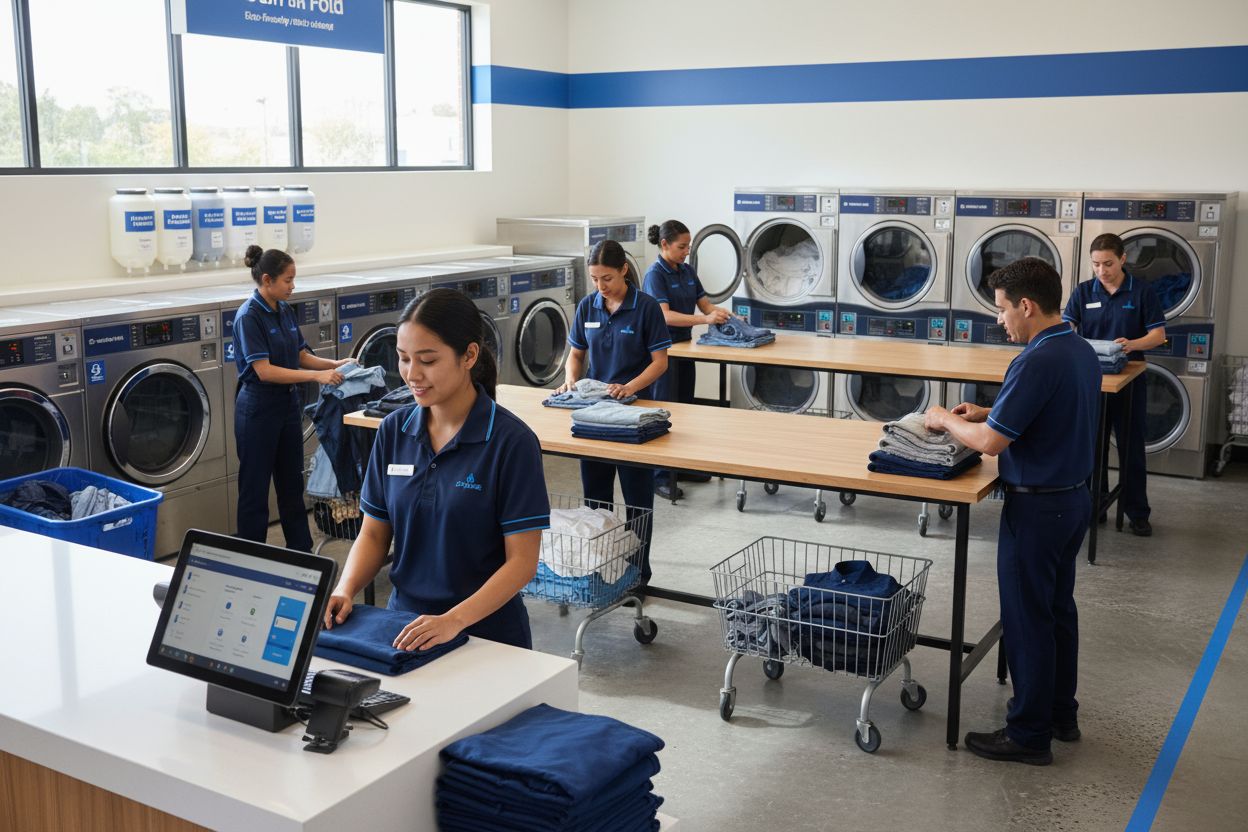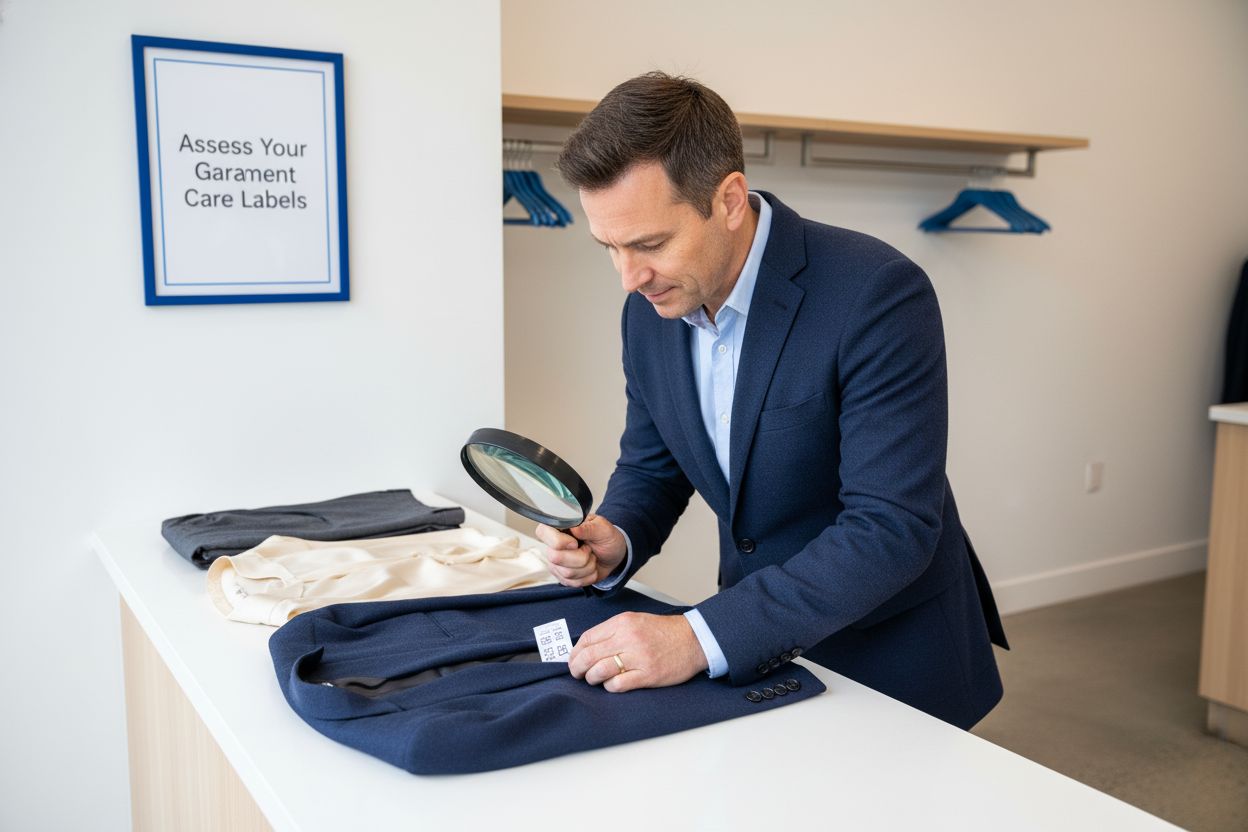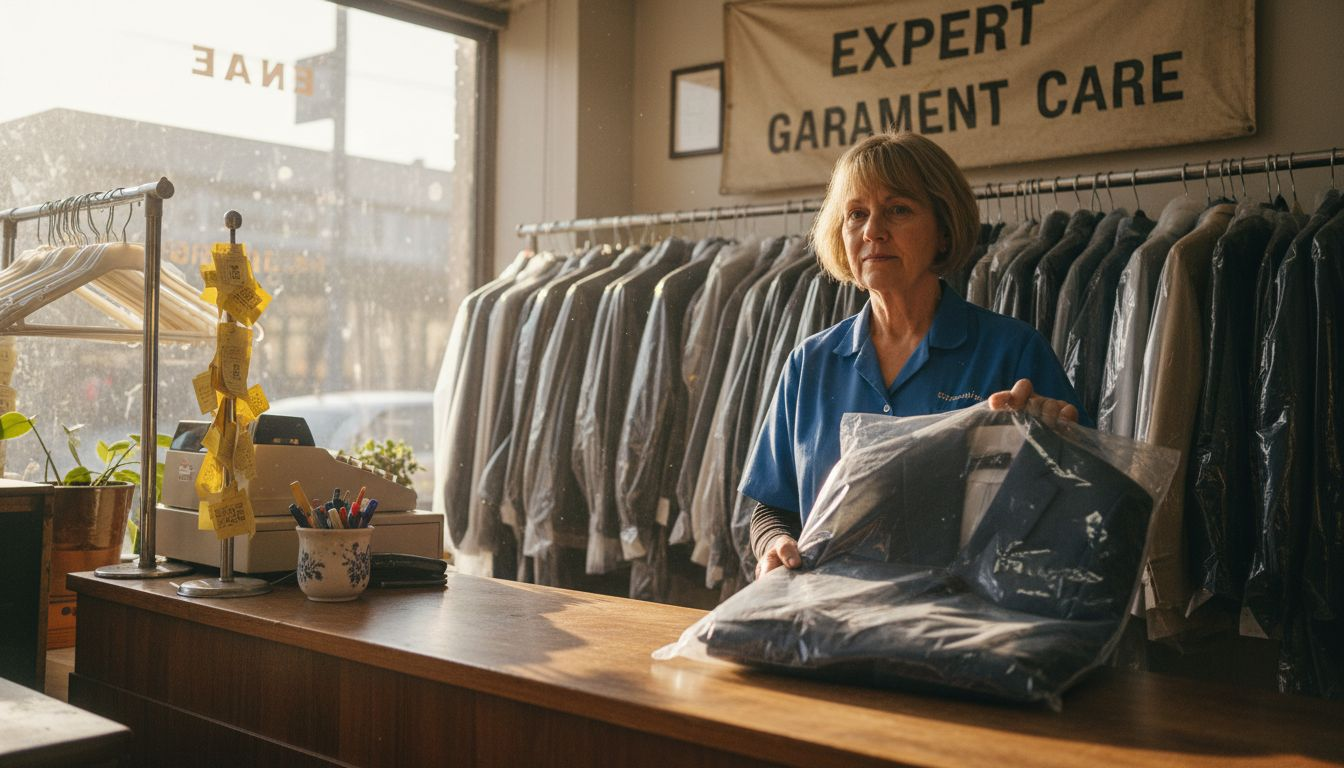How to Wash Clothes Without Detergent
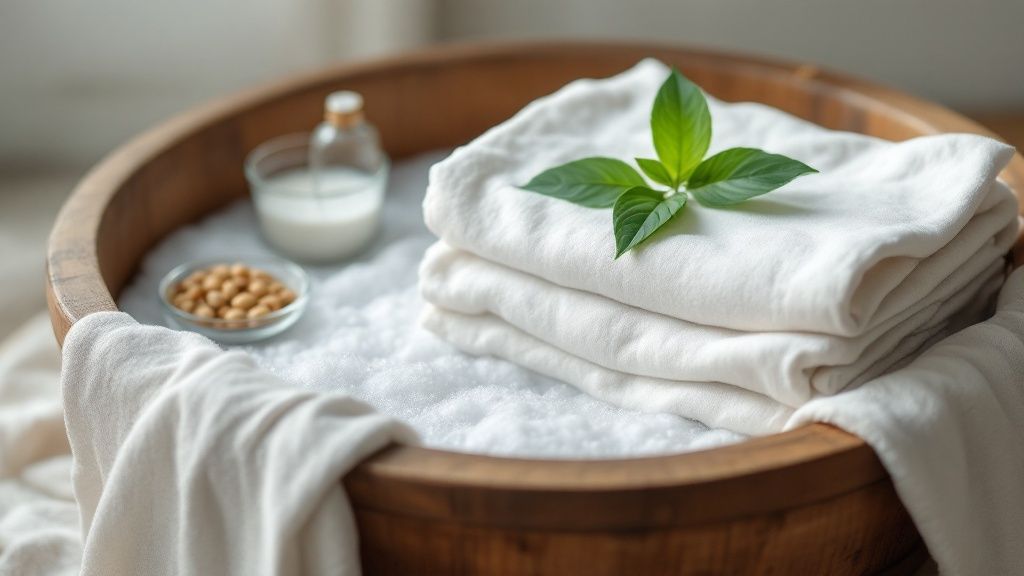
Yes, you absolutely can. It might sound a little strange at first, but you can get a fantastic clean without traditional detergent by using simple household staples like baking soda, distilled white vinegar, or even soap nuts.
These alternatives work right alongside your washing machine's agitation to get deep into fabrics, kick odors to the curb, and even soften clothes naturally. It's a surprisingly simple way to get a chemical-free wash.
Why Skip Commercial Detergent, Anyway?
Moving away from those brightly colored bottles in the laundry aisle is about more than just finding yourself out of soap on laundry day. For a growing number of people, it’s a deliberate choice. It's about wanting a healthier home and being a little kinder to the planet.
Honestly, it's a conscious decision to get back to basics and really understand what we're putting on our clothes—and by extension, our skin.
The reasons for making the switch are pretty compelling:
- Sensitive Skin and Allergies: Let's face it, commercial detergents can be loaded with fragrances, dyes, and harsh surfactants. These are often the culprits behind skin irritation, eczema flare-ups, or allergic reactions. Making a change can bring almost instant relief.
- Environmental Concerns: Many detergents have phosphates and other chemicals that, once they go down the drain, can cause real harm to aquatic life. Choosing natural alternatives means less chemical runoff flowing into our waterways.
- Cost Savings: Pantry staples like vinegar and baking soda are so much cheaper than big-name detergents. When you add it up over a year, the savings can be pretty significant. It’s a genuinely budget-friendly way to do laundry.
This isn’t some new fad. It’s really just a return to methods that have been trusted for generations. Long before mass-produced detergents were a thing, people kept their clothes clean for centuries using what nature gave them.
A Return to Simpler Methods
Rethinking our laundry routine is also a nod to some pretty clever historical practices. For ages, societies got by with natural and manual cleaning. Ancient civilizations used the power of river water and the simple mechanical action of rubbing fabrics against stones to get the dirt out.
Later on, people in medieval Europe figured out that wood ash—which contains potassium carbonate—created a surprisingly potent alkaline cleaning solution when mixed with water. This just goes to show that you don't need a complex chemical cocktail for an effective clean. If you want to dive deeper, The Scrubba's blog has a fascinating post on the history of laundry practices.
Making this switch today kind of connects us back to these simpler, proven traditions of taking care of our clothes.
Your Guide to Natural Laundry Alternatives
Ready to wash clothes without traditional detergent? Your pantry probably has everything you need. Common household staples can completely change your laundry game, giving you a surprisingly good clean without all the harsh chemicals. These natural alternatives work with your machine's own power to lift dirt, knock out odors, and even soften fabrics.
Forget the guesswork. Let's break down exactly how to use these simple but powerful ingredients in your next load.
Harnessing Vinegar and Baking Soda
Distilled white vinegar is a true laundry workhorse. Its acetic acid is fantastic at breaking down body oils and the soapy residue left behind from old detergents—which is often what makes clothes feel stiff and dingy. For a standard load, just pour one cup of distilled white vinegar into the fabric softener dispenser. This releases it during the rinse cycle, letting it work its magic as a natural softener and odor eliminator. And don't worry about the smell; it washes out completely.
Baking soda, on the other hand, is a gentle cleanser and a brilliant deodorizer. Its natural alkalinity helps brighten fabrics and cut through grime. Before you toss in your clothes, add a half-cup of baking soda right into the washer drum. It works wonders on stinky gym clothes and musty towels.
For an extra-powerful clean on your whites, you can even use both in the same load. To get more tips on keeping your white clothes bright without harsh chemicals, check out our full guide on how to wash whites effectively.
Pro Tip: Whatever you do, don't mix vinegar and baking soda together in a bottle before adding them to the wash. They’ll just fizz up and neutralize each other. To get the full benefit, add them separately: baking soda in the drum and vinegar in the dispenser.
Exploring Plant-Based Soap Nuts
If you're looking for a completely plant-based option straight from nature, you have to try soap nuts. Also called soapberries, these dried fruit shells contain saponin, a natural cleaner that creates a gentle, low-sudsing wash. They are incredibly mild, which makes them a perfect choice for anyone with sensitive skin or for washing delicate fabrics.
It couldn't be simpler to use them.
- Put 4-5 soap nuts into a small muslin bag and tie it shut.
- Toss the bag directly into the washing machine drum with your clothes.
- Run your wash cycle as usual—they work great at any temperature.
One of the best things about soap nuts is how long they last. You can reuse the same little bag for up to 5-7 loads of laundry before they're ready for the compost pile. They leave clothes feeling soft with a fresh, neutral scent.
Quick Guide to Natural Laundry Boosters
To make things even easier, here’s a quick reference chart for these common detergent alternatives. Think of it as your cheat sheet for a fresher, more natural laundry day.
Each of these options offers a unique benefit, so feel free to experiment to see what works best for your laundry needs.
The Real Power Players: Agitation and Temperature
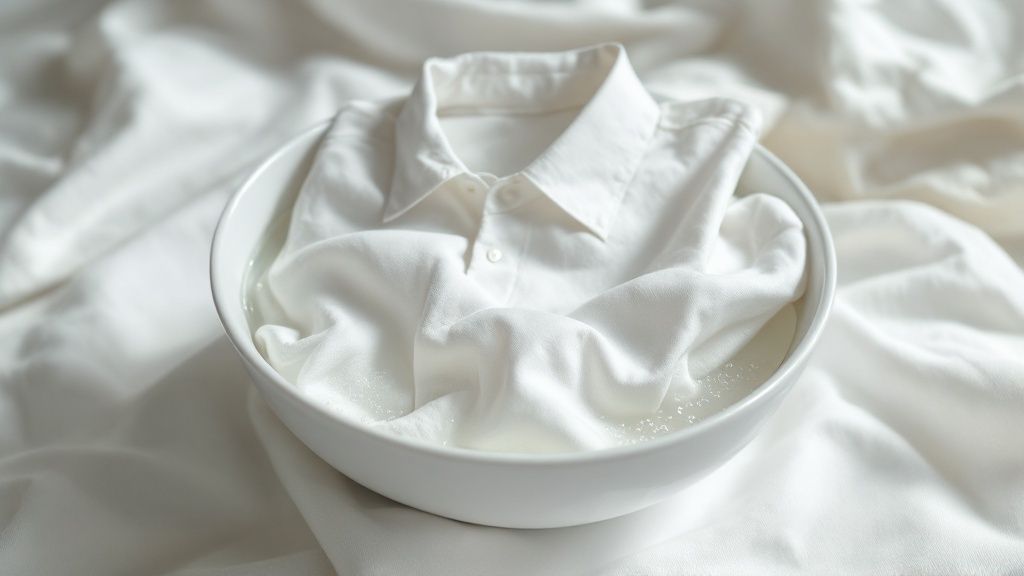
Here's a little secret about washing clothes without detergent: the magic isn't just in what you add to the water, but how you wash. When you take chemical surfactants out of the picture, you're left with two fundamental forces: good old-fashioned mechanical action and water temperature. These become your new best friends for getting a truly deep clean.
Think of agitation as the physical scrubbing that dislodges dirt, oils, and all that grime from the fabric fibers. Without detergent to do the chemical heavy lifting, you need to turn up the dial on this physical action to make sure your clothes come out genuinely fresh.
Boosting the Mechanical Action
It's actually pretty easy to give your machine's cleaning power a boost without touching any special settings. My favorite trick is to add a few laundry balls or even some clean tennis balls to the drum. As they bounce around with your clothes, they create extra friction that helps knock dirt loose. Simple, but it works.
Another way is to simply choose a more intense wash cycle. Look for settings like "heavy duty" or "deep clean." These cycles are specifically designed with longer, more vigorous agitation periods, giving that mechanical scrubbing more time to do its job. Of course, always give your garment care labels a quick once-over first.
The success of detergent-free washing really comes down to the tag team of water temperature and agitation. Interestingly, research has shown that even cold water washing, when paired with intense scrubbing, can achieve 70-80% of the stain removal power of detergents in some cases.
Using Temperature to Your Advantage
Hot water is a fantastic sanitizer and a powerhouse against greasy stains, especially on tough fabrics like cotton or linen. But let's be honest, it's not always necessary and it definitely uses more energy. For most of my everyday loads, cold water does the job just fine and is much kinder to vibrant colors.
A quick note for those in areas with hard water: the minerals can sometimes get in the way of effective agitation, making detergent-free cleaning a bit tougher. In these situations, installing a water softener can make a world of difference in your results.
Tackling Tough Stains and Odors Naturally
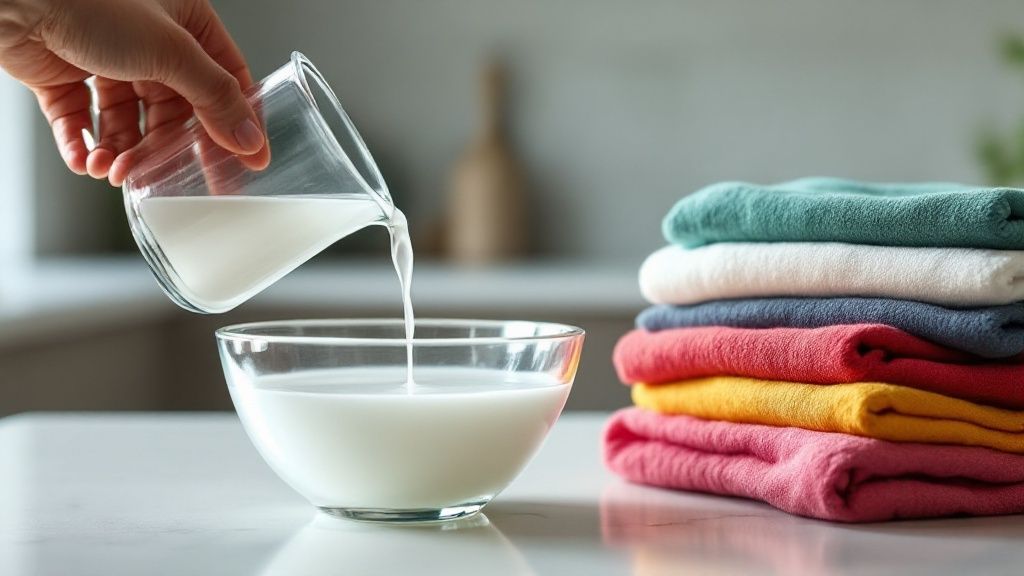
Let's be honest, the biggest question when you ditch detergent is whether these natural methods can handle real-life messes. We're talking grass-stained jeans, musty towels, and that mystery food splash on your favorite shirt. Those are the true tests.
The good news is that targeted, natural solutions can absolutely work just as well as their chemical-heavy counterparts. The trick is to act fast and use the right tool for the job. Your first step? Create a simple, natural stain-fighting toolkit. Think of it as your laundry first-aid kit, ready to go whenever a spill happens.
Your Natural Stain-Fighting Toolkit
You really don't need a whole shelf of harsh chemicals to pre-treat stains. A few common items you probably already have in your kitchen can handle most everyday problems with surprising power.
- Lemon Juice and Salt: This classic combo is a lifesaver for rust spots and mildew. The acidity in the lemon juice gets to work breaking down the stain, while the salt acts as a gentle abrasive to lift it all away.
- Cornstarch or Baking Soda: For those greasy oil splatters from cooking, immediately cover the spot with cornstarch or baking soda. These powders are incredibly absorbent and will literally pull the oil out of the fabric fibers before you even start the wash.
- White Vinegar: Keep a spray bottle filled with a 50/50 mix of white vinegar and water on hand. It's your all-purpose pre-treater, and it works wonders on food stains like ketchup or coffee.
The real secret here is patience. After you apply your natural pre-treatment, let it sit for at least 30 minutes before washing. This gives the ingredients time to actually penetrate the fabric and do their job breaking down the stain.
Eliminating Stubborn Odors for Good
Those really stubborn odors, especially in workout gear or towels that sat damp a little too long, need a more intensive approach. A standard wash just won't cut it. This is where a pre-soak becomes your best friend.
For smelly gym clothes or other synthetic fabrics that trap sweat, a pre-soak in a solution of one part white vinegar to four parts cold water works wonders. Just let the items soak for at least an hour before you toss them in the machine. The vinegar is fantastic at neutralizing the odor-causing bacteria that get stuck in those synthetic fibers.
If you're looking for even more ways to keep your laundry smelling great, our guide on how to make your clothes smell fresh has a bunch of other natural solutions.
The Global Impact of a Simpler Wash
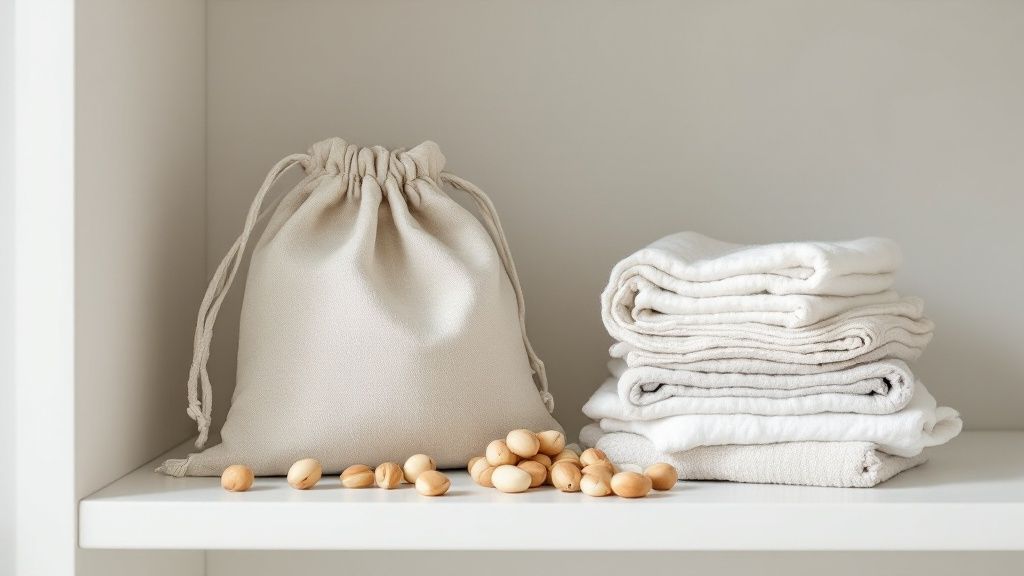
When you choose to wash your clothes without detergent, you're tapping into a massive, global practice that’s anything but new. For a huge portion of the world's population, this is just daily life—relying on simpler, time-tested methods born from necessity and wisdom. This approach isn't some niche trend; it’s a powerful reminder of how resourcefully people have cared for their clothes for centuries.
Believe it or not, estimates suggest that around 2 billion people still do their laundry without modern detergents. In many parts of Africa, Asia, and South America, you'll find people using rivers and streams as their primary washing sites, often scrubbing clothes with natural aids like sand or ash. You can dive deeper into the history of laundry traditions over at The Cleaning Collective.
Your Wash Cycle’s Ripple Effect
Every single load you wash this way creates a positive ripple effect on the environment. You’re actively cutting down on the chemical load entering our water systems, which helps protect aquatic life from the harmful phosphates and surfactants packed into many commercial detergents.
This simple change also shrinks your household’s carbon footprint by sidestepping the energy-heavy manufacturing and transportation that bottled detergents require.
By embracing a simpler wash, you’re not just cleaning your clothes. You are participating in a global movement toward more sustainable living, one load at a time.
This mindful approach doesn't have to stop at the washing machine, either. Pairing a detergent-free cycle with natural drying methods really amplifies the benefits. If you're curious about efficient, energy-free drying, we've got a whole guide on how to air-dry clothes indoors.
Common Questions About Detergent-Free Washing
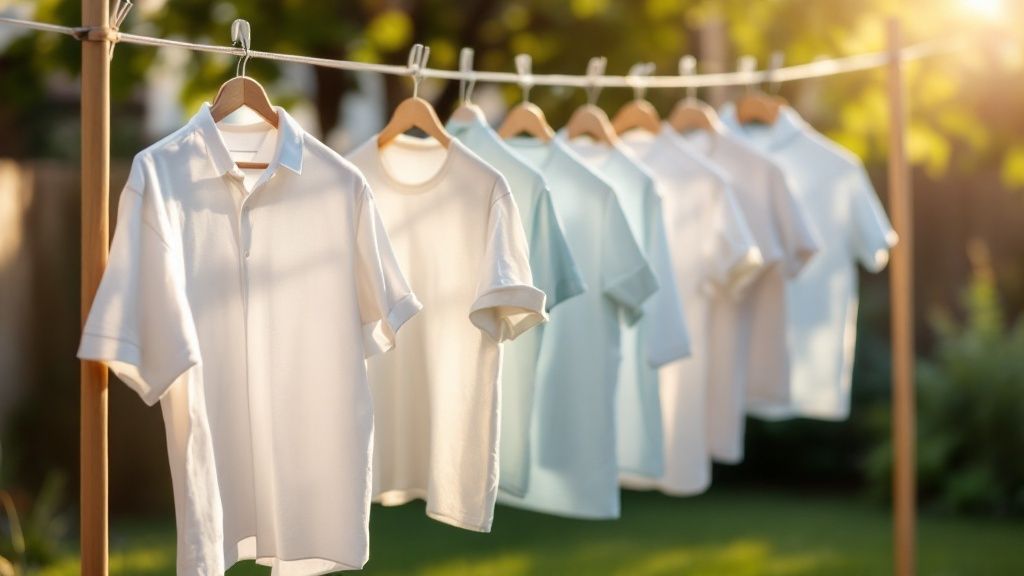
Ditching traditional detergent is a big change, so it's only natural to have a few questions. I get it. You want to make sure you're doing right by your clothes and your washing machine.
Let’s get into the nitty-gritty of some of the most common concerns I hear. Once you have the facts, you can tackle your next load with total confidence.
Will My Clothes Really Get Clean?
This is probably the biggest question on everyone's mind, and the answer is a resounding yes. Your clothes will absolutely get clean.
It’s just a different approach. Instead of relying on the chemical surfactants in commercial detergents, you’re using the natural cleaning power of ingredients like baking soda or vinegar. These work with your machine’s agitation and the right water temperature to break down oils and lift away dirt.
This is a total shift in thinking. You're not just dumping in a chemical cleaner; you're creating a partnership between natural ingredients and your washer's mechanical action. The result is clothes that are genuinely clean, without the chemical residue that detergents often leave behind.
Can I Use Vinegar in a High-Efficiency Machine?
Another excellent and very important question. And again, the answer is yes! It is perfectly safe to use distilled white vinegar in your HE washer.
The key is using the right amount—I usually recommend a half-cup to one cup per load.
Vinegar is a mild acid, which is great for dissolving the mineral buildup you get from hard water. It also acts as a natural fabric softener. Most importantly for HE machines, it does all this without creating excess suds, which are a big no-no. Too many suds can actually damage the delicate sensors and mechanics of a high-efficiency washer.
For the best results, just pour the vinegar directly into your machine's fabric softener dispenser. It’s that simple.
Tired of the laundry pile dictating your weekend? Let Columbia Pike Laundry handle it. We provide professional wash & fold and dry cleaning services with convenient pickup and delivery, giving you back your time and peace of mind. Schedule your first pickup and rediscover your freedom.
Popular Blog Articles

Meet the Author
Daniel Logan didn’t start CPL because he loved laundry. He started it because his family was drowning in time debt, and laundry was one of the biggest weights.
Mornings were chaos with two kids under 5. Evenings felt like catch-up. And weekends? Gone to sorting socks and folding piles.
He knew his story wasn’t unique. So he built a business that gave families like his just a little bit of breathing room one load at a time.
With no laundry experience but deep tech skills, Daniel rolled up his sleeves, doing every job himself while building systems that turned it into a modern laundry service that saves customers time, simplifies their lives, and delivers reliability they can count on.
That’s where CPL began. Not from a playbook, but from pain. From one dad trying to buy back time: for himself, and for every household like his.


